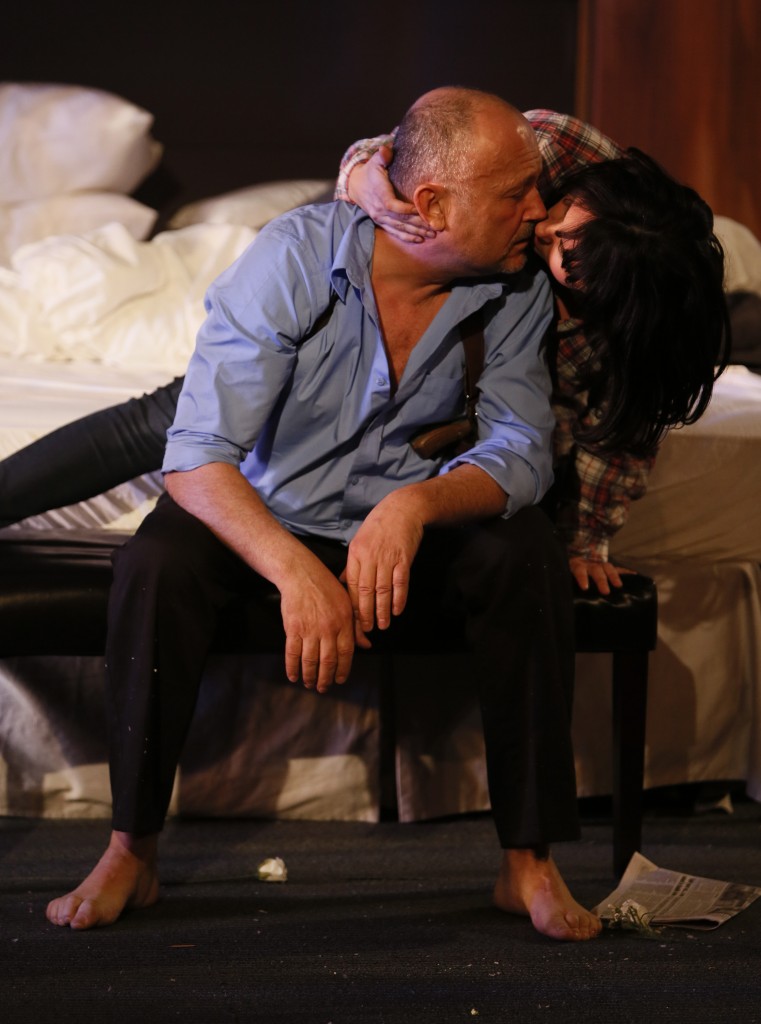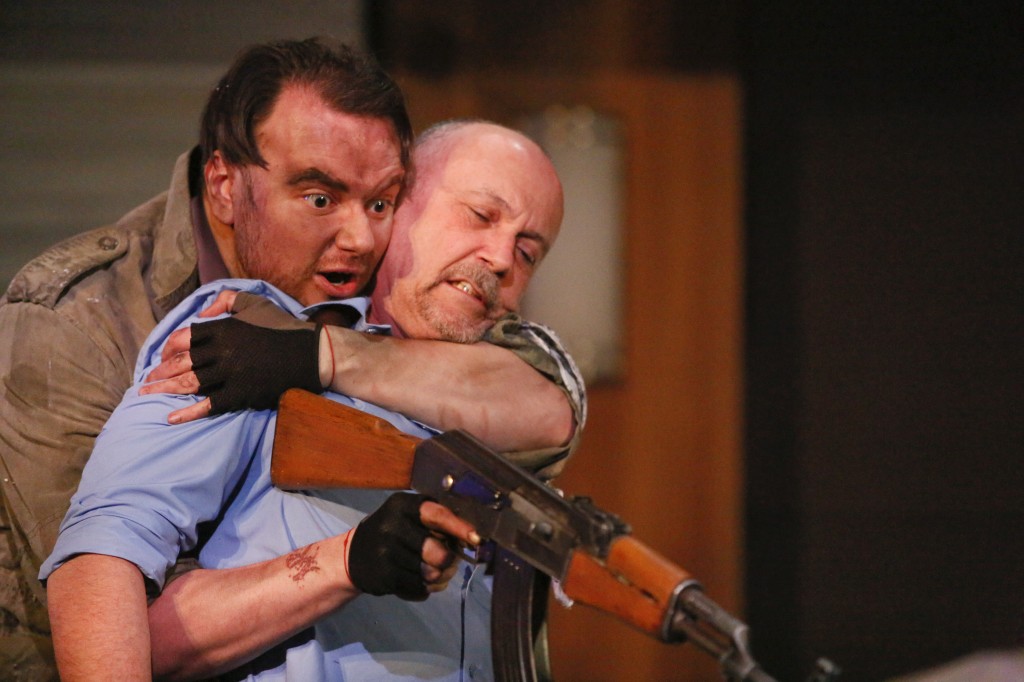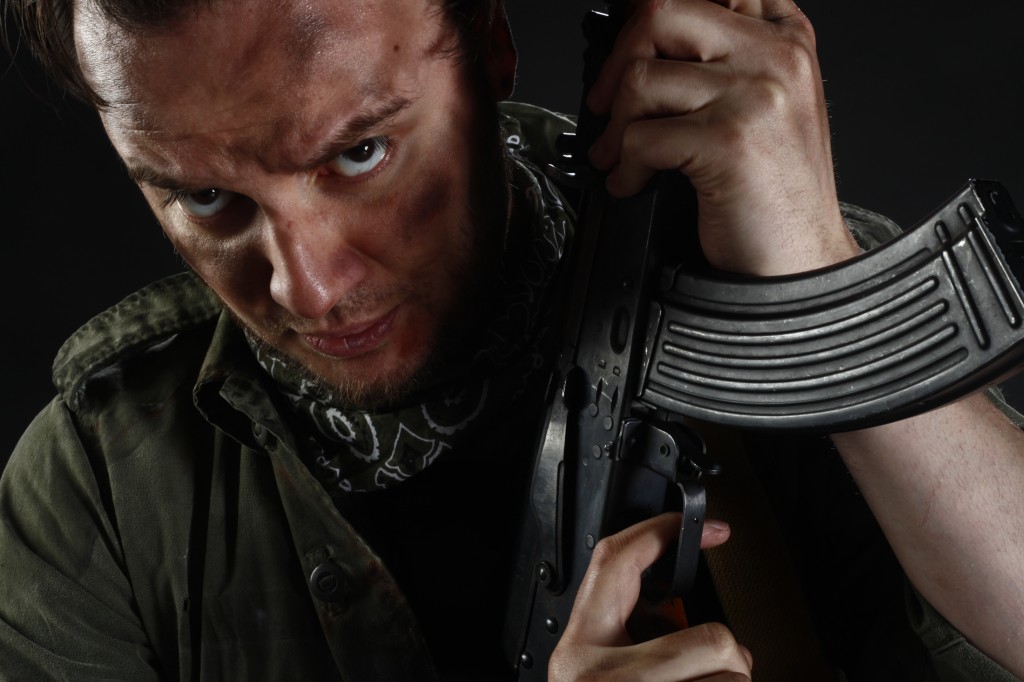
Credit: Tim Matheson
At Performance Works until April 25, 2015
pitheatre.com or tickets at the door
Posted April 13, 2015
Prepare to be verbally assaulted, shocked and disgusted by the late Sarah Kane’s Blasted, which premiered at the Royal Court Theatre Upstairs (London) in January 1995 and is now running at Performance Works on Granville Island. The reviews back then were scathing: “this disgusting feast of filth” was the Daily Mail’s verdict while Paul Taylor of The Independent wrote that it was, “like having your whole head held down in a bucket of offal”. The Guardian’s Michael Billington dismissed it as “naïve tosh”. But Harold Pinter and Caryl Churchill rushed to the defence of what was Kane’s first play and many critics, including Billington, have recanted or to some extent softened their opinion following the 2010 Lyric Hammersmith (London) revival.
This Pi Theatre production, directed by Richard Wolfe, is only the second professional production mounted in Canada and it’s easy to see why: it’s bleak, violent, harrowing and offensive. But its themes are important.
Kane, who wrote only five plays before committing suicide in 1999 at the age of twenty-eight, suggests the seeds of brutality lie within us all, that we are all capable of unimaginable cruelty. We have probably all asked ourselves if, ordered to do unspeakable things, whether there are circumstances under which we would obey those orders. The war in Bosnia was, apparently, her inspiration but the implication is that domestic violence, happening everywhere, every day, is merely one end of the spectrum, the end point of which is war and all the atrocities that entails.
Kane also makes the point that our capacity for cruelty may be dormant in peacetime but is triggered by war.
From the opening line, spoken by Ian, a forty-something sleazebag journalist upon entering a high-end hotel room, “I have shat in better places than this”, the ugliness begins. And when Cate, a young woman – a bit simple – wearing a backpack, nervously follows him into the room, we know instinctively that something perverse is going to happen in this room.

Credit: Tim Matheson
How do we know this? By the cocksure swagger of actor Mike Kopsa (Ian). By the nervous frailty of Cherise Clarke (Cate). By the gun Ian has holstered on his body. By the fact that, moments into the play, Kopsa is half-naked with a towel wrapped around his waist. By Clarke’s childlike, jittery examination of the room, bouncing on the bed, smelling the bouquet of flowers. Something is definitely out of whack here unless Cate is Ian’s daughter but somehow instinctively we know this is not the case. There’s a power imbalance here and it’s not going to be pretty.
The menace ramps up – way up – following a huge explosion (fantastically executed by Drew Facey and the crew) and the arrival of the Soldier (Raresh DiMofte), dressed in filthy camouflage and aiming an assault rifle at Ian. This character speaks of such appalling crimes he has committed, that I actually thought I could not hear what DiMofte was saying. Later, upon reading the script, I realized I had heard every horrifying word; I simply couldn’t or wouldn’t believe my ears. DiMofte’s performance will get your hair standing on end and haunt your dreams. Some images won’t ever go away.

Credit: Tiim Matheson
The staging and the effects are terrific. The performances are chillingly, frighteningly real. It is a bleak, bleak vision of the present. It’s Beckett + Pinter + Tarantino and it’s not for every eye or ear.
It might have been the playwright’s intention to end Blasted on a note of humanity – albeit it desperate. I did not feel that. Some might.
You will be blasted with racial slurs, obscenity, cannibalism, simulated oral and anal rape and masturbation. You will want to shower off when you get home. But you will be left thinking. Ironically and disturbingly, as pointed out by Kane, Blasted raised more indignation than actual world events.

